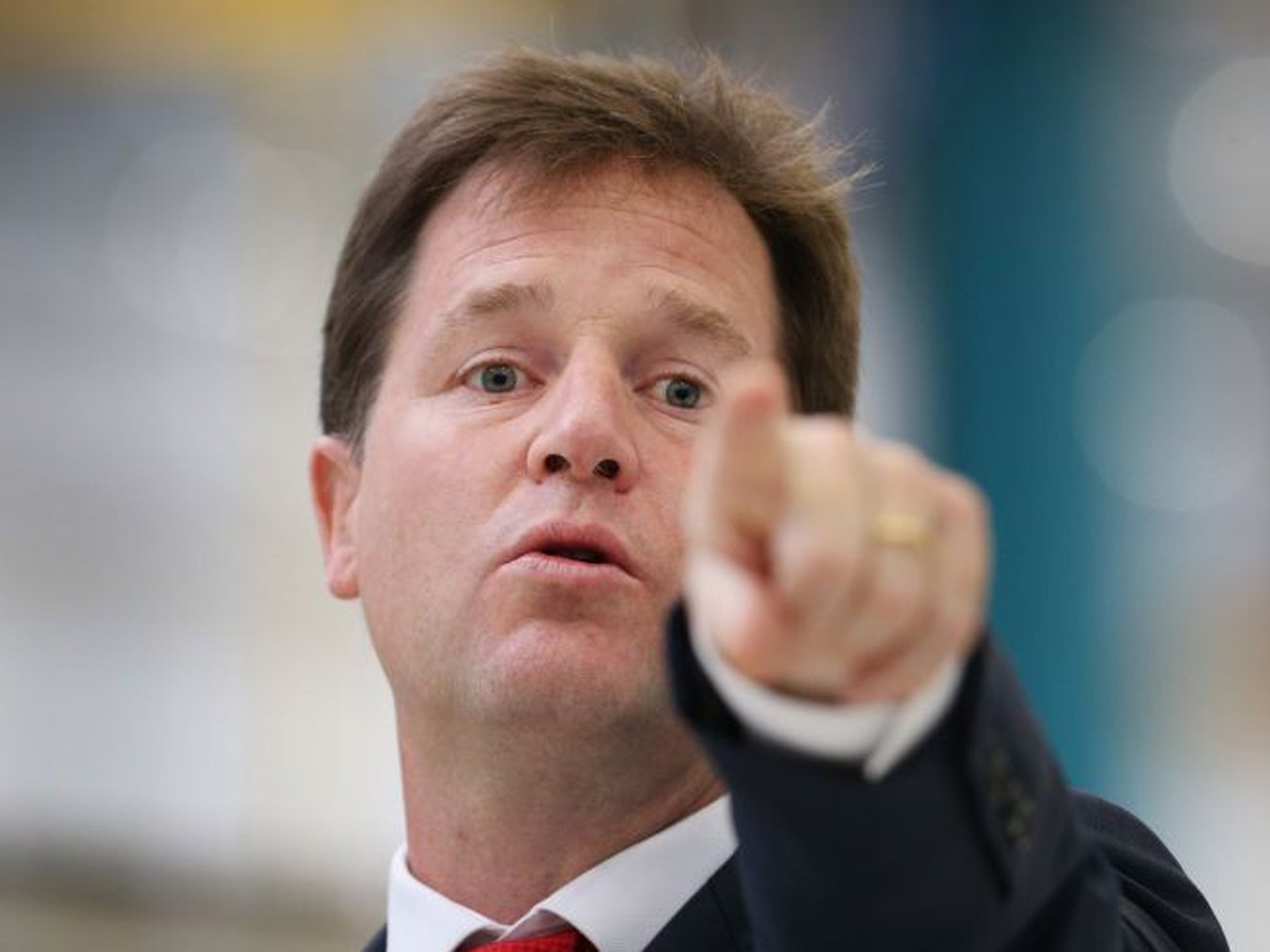EU exit would be 'economic suicide', says Nick Clegg as he issues call to arms for support against Eurosceptics
Deputy Prime Minister acknowledges referendum on UK's membership of European Union is inevitable

Your support helps us to tell the story
From reproductive rights to climate change to Big Tech, The Independent is on the ground when the story is developing. Whether it's investigating the financials of Elon Musk's pro-Trump PAC or producing our latest documentary, 'The A Word', which shines a light on the American women fighting for reproductive rights, we know how important it is to parse out the facts from the messaging.
At such a critical moment in US history, we need reporters on the ground. Your donation allows us to keep sending journalists to speak to both sides of the story.
The Independent is trusted by Americans across the entire political spectrum. And unlike many other quality news outlets, we choose not to lock Americans out of our reporting and analysis with paywalls. We believe quality journalism should be available to everyone, paid for by those who can afford it.
Your support makes all the difference.The Deputy Prime Minister Nick Clegg today said that people need to decide which side they are on over links with Brussels ahead of next year's European elections, in an outspoken defence of Britain's membership of the EU.
Mr Clegg acknowledged a referendum on the UK's membership of the European Union was inevitable, but described the Prime Minister's plan for a renegotiation of the relationship followed by a public vote before the end of 2017 as "flawed".
The Deputy Prime Minister called on business leaders and charities to form a new "coalition in the national interest" and speak out in favour of the EU before Britain found that it had "stumbled out" of the alliance, an outcome that he described as "economic suicide".
He has written to over 100 organisations, including business and trade groups, as well as charities, urging them to publicly support the UK's membership.
The Eurosceptic group Business for Britain, which seeks to renegotiate the terms of the UK's EU membership, accused Mr Clegg of "scaremongering".
Mr Clegg acknowledged that there was some common ground with David Cameron over the need to protect Britain's interests in the single market, as the eurozone countries integrated more closely to help prevent another banking and debt crisis.
Answering questions at the east London headquarters of Swiss technology firm Buhler Group, he said,"I don't think it should be any surprise that there is a consensus, other than among those who want to leave the European Union, that the single market is a good thing and needs to be protected."
"Clearly, any further evolution in the way that the European Union is run, not least as the eurozone integrates further, needs to be done in the way which nonetheless safeguards the virtues of that single market stretching across both eurozone-ins and eurozone-outs. I think that is something which I suspect everybody would agree upon."
But Mr Clegg attacked his coalition partner's strategy for a renegotiation of the relationship with Brussels, saying it would not be accepted by his party.
Characterising the plan, with its 2017 deadline, as a "doomed" political fix to end internal Tory divisions in the run-up to the 2015 general election, Mr Clegg said the Prime Minister was "playing with fire" and "it is Britain that will get burned".
He added, "I don't think it's very complicated to imagine circumstances in which you could reform here, have a little smidgen of repatriation there, a treaty wording change there.
"That's not really the issue. The issue is I don't believe that will ever meet the test which is actually being set by the vast part of the Conservative Party, which is that they don't just want another treaty change with a bit of reform, they want a complete semi-detachment or indeed total exit of the European Union.
"That's why I think the whole strategy is flawed, because it is raising expectations, certainly among the ranks of the Conservative party, which will not be met by that process."
The Liberal Democrat leader's view is that next year's European elections will be fought as a proxy for the choice between remaining in of leaving the 28-member block.
"Now is the time to have a much more fundamental and visceral debate about what side are you on in this basic divide - are you basically for leading the reform of the European Union by being committed to it, or are you half out the door, or do you advocate exit altogether."
Mr Clegg said among the reforms he would like to see would be an end to the "bonkers" situation where the European Parliament alternates between Brussels and Strasbourg.
"Some of its working practices, not least its second seat in Strasbourg, are totally bonkers and should be changed," he said.
Join our commenting forum
Join thought-provoking conversations, follow other Independent readers and see their replies
Comments